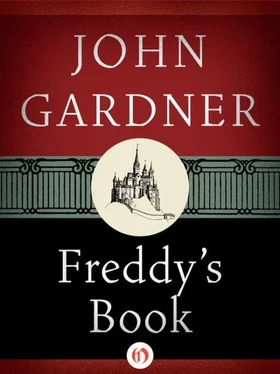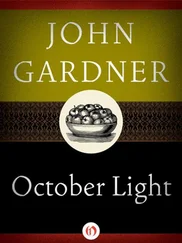With an effort, the old man raised his eyelids, then set down his glass. “I must sleep,” he said. “Translate it any way you please. Whatever we do is presumably God’s will.” He pressed down on the chair-arms and rose.
The young man looked at him, distressed, his head full of arguments, but in the end, with the other priests gathering around him, he said nothing, but officiously rose to help the bishop to his room.
In the morning none of them referred to the midnight discussion. Perhaps, on reflection, the young priest had decided to take advantage of the old man’s irritable concession and do exactly as Brask had ironically advised — translate any way he pleased. After matins and breakfast, as they were mounting their horses — the bishop stiffly, as if the pain he had still not mentioned were much greater now — the young priest asked, “Will you be passing through Dalarna?”
Glancing at the bishop, who showed nothing, Lars-Goren answered, “No, that’s out of our way. We’ll be heading straight north.”
“Ah,” said the priest, and nodded.
Bishop Brask studied him with drawn lips. His old horse stamped irritably, but the bishop held him in a moment longer. He asked sternly, “Why?”
The priest shrugged. “There are always rumors of trouble in Dalarna,” he said, and gave a laugh.
“What this time?” Lars-Goren asked.
With studied off-handedness, to show that he himself was in no way involved, he told them of the Daljunker — the young gentleman of the Dales — who claimed he was Nils Sture, that young Nils was, after all, not dead but had escaped Gustav’s wrath.
“That’s absurd,” Lars-Goren said, flashing anger. “What wrath? Who ever said Nils Sture was dead?”
“He’s not?” asked the priest.
Bishop Brask, heavy on his horse, flicked his reins slightly, moving without a word of farewell down the path toward the road. Lars-Goren looked after him, then nodded to the priest and started out behind him, trotting to catch up. The road was lightly speckled, like an eel’s back, with light and shadows. “More work of the Devil?” said Lars-Goren.
“Everything’s the work of the Devil,” said the bishop.
“Everything?” Lars-Goren asked, ironic.
“Nothing then; whatever you like,” said the bishop, and said no more.
3.
THEY RODE THAT DAY only as far as Lake Daläven. As on the previous day, the bishop sometimes rode for miles without a word, other times spoke freely. Once Lars-Goren said, riding through a forest as dark as a cave except for a few threads of sunlight — a forest so thick there was no underbrush, only a carpet of pine needles—“It puzzles me, Bishop, that you decided to come north with me. Surely you had friends you could have turned to for protection. It hasn’t escaped me that you ride like a man in some discomfort; back trouble, perhaps, or possibly something worse, though I hope not.
“Yes,” Bishop Brask said, a sullen, disembodied voice in the darkness to Lars-Goren’s right, “I’m old for a trip like this, that’s true.”
Lars-Goren waited, listening to the footfalls of the horses, and when the bishop said no more, he said, “Yet you’ve come. It does seem strange.”
“Strange,” the bishop agreed, and then, with a sigh, as if only to avoid further hounding on the question, “I hardly know myself why I decided to come. Perhaps just exhaustion. No doubt that sounds strange — to take a long, arduous trip out of exhaustion — but when a man reaches my age, or my mental state, call it what you like, it can sometimes seem easier to walk on foot to China than to wrestle over trivial decisions.” He rode awhile in silence, then spoke again. “That was mere rhetoric, I’m sure you noticed. ‘Walk on foot to China.’ I live on rhetoric, like a spider on its threads. Perhaps I imagined I could outride the edge of my rhetoric. More rhetoric, you’ll notice.”
Lars-Goren said nothing.
“I remember when I imagined some connection existed between rhetoric and the world. I remember the feeling. Very pleasant, like the feeling of union between man and a woman when they couple. A curious illusion, when you stop to give it thought. I doubt that would have quite that feeling if one did it with a sheep or, say, a unicorn. But one never stops to think about such things when one’s young. ‘I love thee, Kristina!’ cries Sören; ‘Sören, I love thee!’ cries Kristina — and the world pops open like a flag. Oh yes, ah yes.” He heaved a sigh. “I’ve watched it, de temps à temps. I remember young Gustav. How I envied him there beside Lake Mora, full of faith in himself! Then Norby. Poor gudgeon, he had it too.That’s one of the Devil’s main tricks, of course. Fill a man with faith. What evils, what absolute horrors the noble sword of faith sends pouring into the world!”
“Strange words from a bishop.”
“Yes, I admit it. I’m not at my best, I’m afraid. I might say this in my defense. … More rhetoric, you’ll notice. ‘ I might say this in my defense.’ But never mind, never mind. I might say this, as I was saying: I haven’t made the trip out of ignorant faith, like you, my dear knight. No offense! Merely an observation! You, Lars-Goren: with no place to turn, where do you turn? Back home! Not because your wife or your children can help you, or your peasants and villagers, most of whom have never seen a war. And even if they had, of course, even if every last one of them was a seasoned veteran, what could little Hälsingland do against all Sweden? Can your castle withstand a siege by Gustav? Will he forget you, abandon you to your family? Never! Then why have you come? Because you’ve come, that’s all. Surely you’re aware of it yourself, my friend. Home is, for no reason you can find words for, the seat of your power. If something will turn up, it will turn up — or so you imagine — there. You’re wrong, that’s my opinion, or at any rate my guess. It’s a fool’s faith. And yet you act on it! That’s the beauty of faith. One acts on it.”
“But not you, you claim.”
“Not me. No.”
“You’ve lost me again. Why is it you’ve come?”
Ahead of them, they could see light. We’ll soon be out of the woods, thought Bishop Brask. But only in the literal sense, of course. That was one of the fundamental symptoms of despair, it struck him now — the discovery that the literal world was no adequate metaphor. He could write a book on despair — who could do it better? But of course one couldn’t write in this condition. And what good would it do anyway, a book on despair? Whom would it serve? On the other hand, what difference if anyone was served? On the other hand, why write at all?
Out of the dimness Lars-Goren was asking again: “Why is it you’ve come?”
Strange to say, Bishop Brask thought, framing the words he might say to Lars-Goren but did not have the energy to say, I was once in love. Yes, me! Hans Brask, Bishop! It was an illicit love — to say the least! A young man! and worse yet, eunuchus ex nativitate. Nevertheless it was so. I was in love.
It was not a feeling one could explain to a man like Lars-Goren, but it had been real, and powerful. He remembered how his friend, a young prior, had changed the light and air he walked in. Perhaps there were women who could have, for some, the same effect; but it had seemed to Hans Brask, and seemed to him yet, that nothing in the world could be more beautiful than the gentleness of that man. When he listened to someone arguing a position of some kind — whether Brask or someone else — he had listened with a strange openness of heart, his head slightly forward, encouraging, as if to say “Yes! Yes, good! That’s an interesting point!” He was like the Christ Hans Brask had in those days imagined, divine in the invulnerability of his spirit. If someone attacked or insulted him, the young prior dismissed it instantly as something he himself might have done if he had misunderstood in exactly the way his attacker did, for no one would hate anyone, he was persuaded, if understanding were complete. He was a grinner and a nodder. You spoke, he nodded, pulling out your words as a fisherman pulls a fish. When he disagreed, he said so — but enough, enough!
Читать дальше











